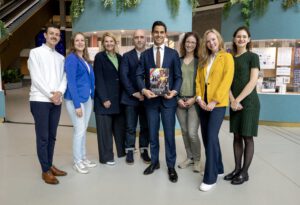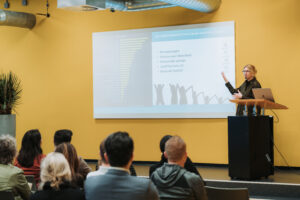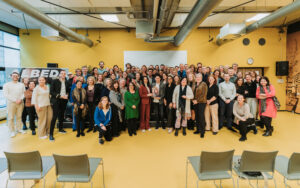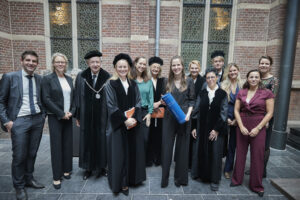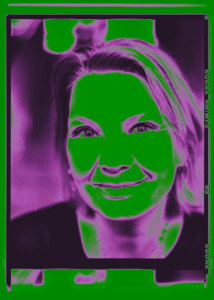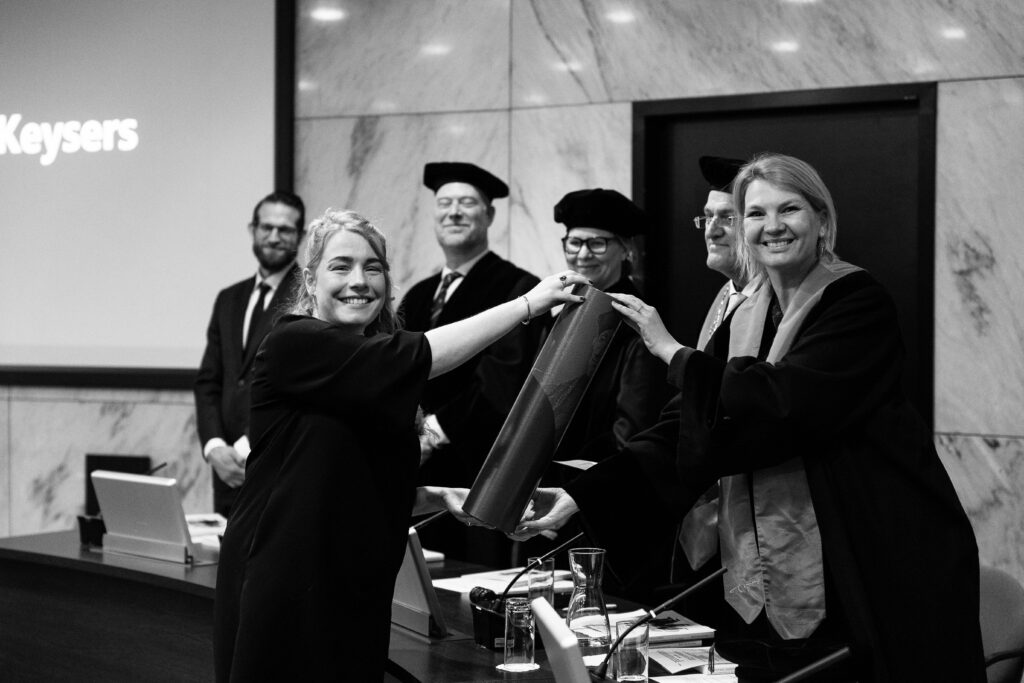On June 18 Lina van Drunen defended her dissertation entitled “Rhythms of Resilience: Individual Differences in Genetic and Environmental Effects on Brain Development.”
What impact does growing up in a musical environment or during the COVID-19 pandemic have on the brain development of teenagers? This was the focus of psychologist Lina van Drunen’s PhD research, which studied hundreds of twins. Her findings reveal that practising music slows brain development, presenting unique opportunities.
Developmental psychologist Lina van Drunen understands the dedication required to learn a musical instrument like no one else. ‘I play guitar and sing, so I was particularly interested in discovering how these activities affect brain development.’ As she delved into the literature, she realised: ‘A lot of research has been conducted on the effects of disadvantaged environments on the brain, such as growing up with many stressors. However, there’s been little investigation into the effects of cognitively enriching environments, such as those filled with music.’
For her PhD research, Van Drunen examined the influence of a musical environment and of the COVID-19 pandemic on the brain development of 500 pairs of twins aged 7 to 14.
A unique opportunity
‘The data collection for my research began eight years ago, but my PhD journey lasted four years,’ Van Drunen explains. When the third MRI study commenced in 2020, more than 100 pairs of twins had already participated before the COVID-19 pandemic started. ‘Then the research halted for three months. That was a shock, but fortunately, we could resume the measurements afterward.’ This period offered a unique opportunity. ‘We could now measure the impact of the pandemic as a disadvantaged environment on brain development. We already had data from a group of young people who hadn’t experienced the pandemic, allowing us to compare it with those growing up during the pandemic.’ Over six years, the twins underwent three MRI scans, performed cognitive tasks, social behaviour tasks, and a sensorimotor synchronisation task to measure musicality.
‘We suspect that the brains of musical youngsters develop longer’
Playing music slows down brain development
In the musicality task, the researchers measured how well the participants could move their fingers to the beat of a metronome and music. They then looked at how brain development predicted how good young people were at that task. ‘We saw that some brain regions developed more slowly in young people who were good at the music task and practised a lot on an instrument than in young people who were less good at the music task.’ That sounds negative, but Van Drunen and her colleagues actually interpret this result as a sign that the brain is developing more slowly. ‘Our suggestion is that the brains of musical youngsters develop longer and the so-called window of learning is wider. We already saw this effect in young people who occasionally play music at amateur level.’ That a musical environment is enriching for brain development is also consistent with previous research.. This shows that playing music lowers stress, improves emotion regulation and is good for your social interaction because you play with others.
‘The COVID-19 pandemic required youth to mature more quickly in certain areas’
Effect of the COVID-19 pandemic
On the contrary, the researchers saw an opposite effect when they looked at the impact of the corona pandemic. ‘There, we saw accelerated development of certain brain regions, notably the medial prefrontal cortex and hippocampus that are associated with social interactions and regulating stress. Such accelerated development is not necessarily a bad thing. Brains seem to adapt in this way so that you can best survive in the environment you grow up in. The corona pandemic required young people to mature faster in certain areas.’ Moreover, after a while, the brain region involved in taking another person’s perspective developed at a rate similar to that before the pandemic. ‘So apparently children found ways to maintain social contacts in a new way. That also indicates resilience.’
Teenagers’ well-being
Van Drunen stresses that her results say nothing about how bad or desirable it is if the brain develops at a certain rate. ‘We now know that the environment plays a major role in how that happens in the teenage years, but it is not yet clear what influence this has on young people’s well-being.’ She will therefore be investigating this further in the coming years as a postdoc of the ActiveMinds project at Erasmus University in Rotterdam. ‘Together with young people, we will find out how they think about mental and physical well-being and how we can best measure it. That way, we will learn with them what they can do to boost their own well-being.’
Promotors: Prof. Dr. Eveline Crone and Dr. Lara Wierenga
Lina was invited to explain her research on the radio program NTR program Podium Klassiek, you can listen to the interview
here.


